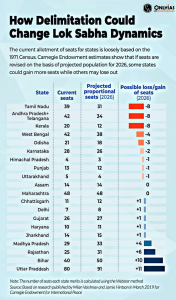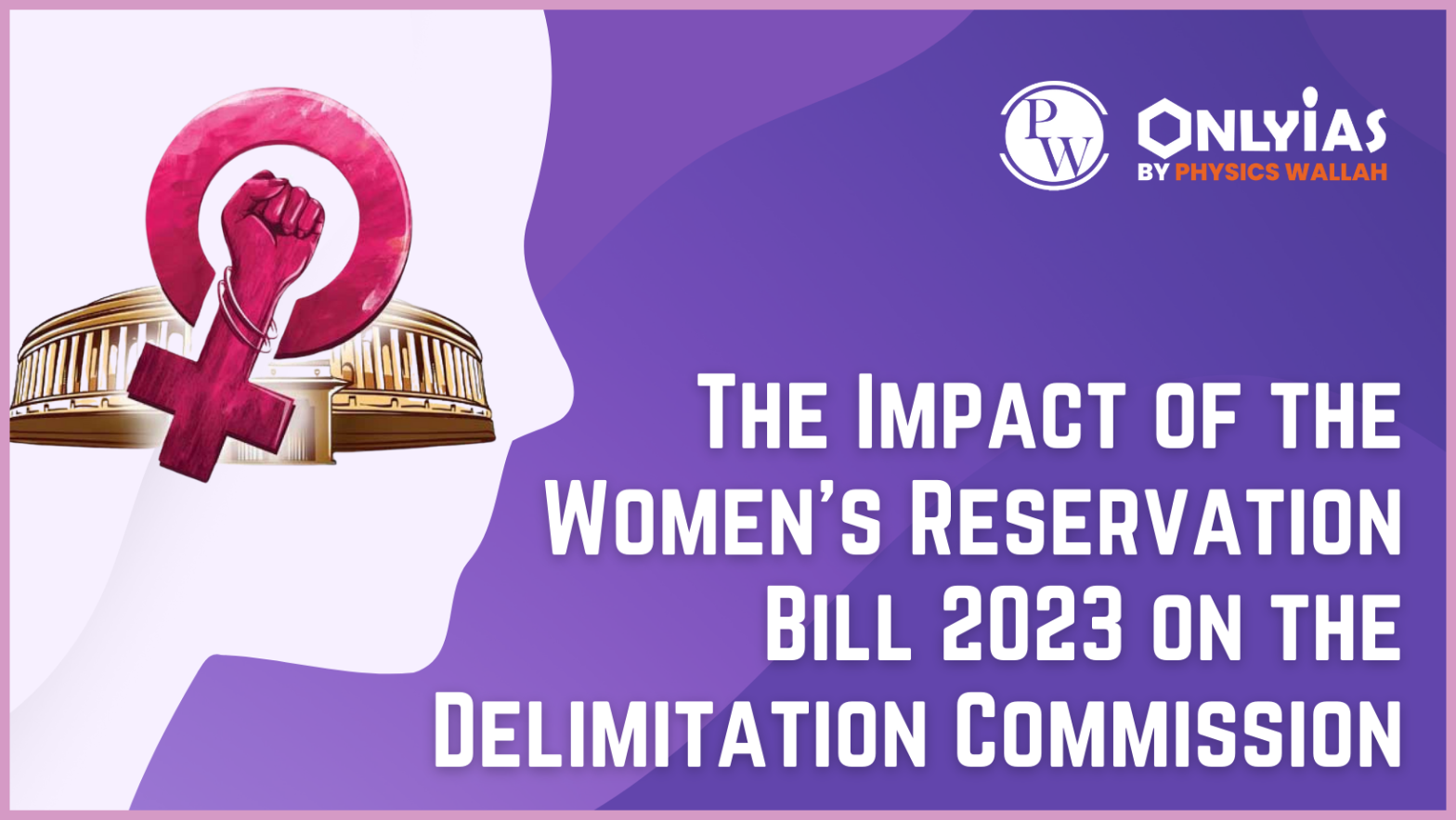Context:
- This article is based on an Editorial “ Taking India Back to the drawing board” which was published in The Hindu. The recently passed, One Hundred and Twenty-Eighth Amendment Bill, 2023, popularly referred to as the Women’s Reservation Bill highlights the delimitation commission of electoral constituencies.
| Relevancy for Prelims: Delimitation, Delimitation Commission and associated Constitutional provisions.
Relevancy for Mains: Delimitation and Delimitation Commission and its need, significance, challenges and steps need to be taken to counter associated concerns. |
About Delimitation Commission:
-
- Fixing Constituencies & Boundaries: The exercise of carving electoral constituencies and fixing their boundaries is referred to as delimitation.
- Delimitation Commission: It was set up by the Union Government.
- Appointed by: It is appointed by the President of India.
- Collaboration: It works in collaboration with the Election Commission of India.
- Frequency of Set Up: It has been set up four times in the past — 1952, 1962, 1972 and 2002 — under Delimitation Commission Acts of 1952, 1962, 1972 and 2002.
- Composition of Commission:
- A retired Supreme Court judge,
- The Chief Election Commissioner, &
- The respective State Election Commissioners.
- Mandated: Commission’s Role in Achieving Electoral Uniformity and Equity
- Maintain Uniformity: The Delimitation Commission will determine the number and boundaries of constituencies to make the population of all seats, as far as practicable, be the same throughout the State.
- Identification: It identifies seats reserved for Scheduled Castes and Scheduled Tribes, wherever their population is relatively large.
- Unquestioned Power: The Constitution mandates that the orders of commission are final and cannot be questioned before any court.
- Emerging Concerns:Against the Constitutional Values: Delimitation commission using outdated population figures (i.e 1971) contradicts the constitutional values of federalism and representation of States as consolidated units.
- Seat Loss Fear: Southern States fear losing parliamentary seats due to population increase disparity with northern states.
Articles and Amendments associated with Delimitation Commission under the Constitution:
- Article 81 of the Constitution: It says that each State gets seats in the Lok Sabha in proportion to its population.
- Article 82 of the Indian Constitution: It says that the Parliament enacts a Delimitation Act after every Census. After the commencement of the Act, the Union Government constitutes a Delimitation Commission.
- 42nd Constitutional Amendment, 1976: It had frozen the delimitation process until 2001.
- 84th Amendment Act, 2002: The above freeze was extended till the first census after 2026 (i.e., Census 2031) to boost family planning norms.
|
Reforming Delimitation commission: Strategies for Equitable Electoral Representation
- Preserving Current Seats: The Parliament could specify that no state will lose its current number of seats under the Delimitation Commission. This would prevent any regions from feeling like they have been “downgraded” or lost representation.

- Flexibility: There can be specific arrangements to give representation to particular areas, including areas that might be underrepresented otherwise. This will require political negotiations and decisions by the Parliament.
- Recognising Demographic Divergence: There is a need for a delimitation commission to recognize the regional variations in population growth and migration patterns. This could influence how the seats are allocated after delimitation.
- Establishing a Normative Proportionality: Need to set a normative proportionality based on population, and then allowing deviations depending on specific circumstances. This means setting a standard ratio of population to representatives, but allowing exceptions in certain cases.
- Accommodating Marginal Voices: Need for an approach that does not only consider population size but also the characteristics of representation, such as the inclusion of voices from marginal communities like tribal people and the elderly.
- Migration Impact: The concerns and interests of migrant populations should be considered in the delimitation commission.
Conclusion
The Women’s Reservation Bill, which provides 33% reservation for women in elections of Lok Sabha and state assembly, has been passed by Parliament. However its implementation is a complex exercise and some sources have stated that it may not come into effect before the 2029 Lok Sabha election due to the need for a delimitation commission exercise and the Census.
| Attempt the Mains PYQ – “The reservation of seats for women in the institution of local self-government has had a limited impact on the patriarchal character of the Indian political process”. Comment. (GS Paper 2; UPSC Mains-2019). |
![]() 25 Sep 2023
25 Sep 2023


